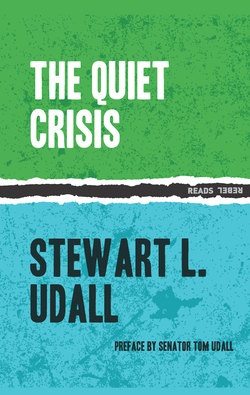Читать книгу The Quiet Crisis - Stewart L. Udall - Страница 6
На сайте Литреса книга снята с продажи.
ОглавлениеFOREWORD
ONE WEEK last fall, two events came to my attention which seemed to sum up the plight of modern man: the first was a press report which indicated that T. S. Eliot, the poet, was a victim of London’s latest “killer fog” and lay gravely ill; the second was a call from a preservation-minded citizen of New Hampshire who informed me that Robert Frost’s old farm—fixed for all time in memory by the poem “West-running Brook”—was now an auto junk yard.
The coincidence of these two events raised questions in my mind: Is a society a success if it creates conditions that impair its finest minds and make a wasteland of its finest landscapes? What does material abundance avail if we create an environment in which man’s highest and most specifically human attributes cannot be fulfilled?
Each generation has its own rendezvous with the land, for despite our fee titles and claims of ownership, we are all brief tenants on this planet. By choice, or by default, we will carve out a land legacy for our heirs. We can misuse the land and diminish the usefulness of resources, or we can create a world in which physical affluence and affluence of the spirit go hand in hand.
History tells us that earlier civilizations have declined because they did not learn to live in harmony with the land. Our successes in space and our triumphs of technology hold a hidden danger: as modern man increasingly arrogates to himself dominion over the physical environment, there is the risk that his false pride will cause him to take the resources of the earth for granted—and to lose all reverence for the land.
America today stands poised on a pinnacle of wealth and power, yet we live in a land of vanishing beauty, of increasing ugliness, of shrinking open space, and of an overall environment that is diminished daily by pollution and noise and blight.
This, in brief, is the quiet conservation crisis of the 1960’s.
It is not too late to repair some of the mistakes of the past, and to make America a green and pleasant—and productive—land. We can do it if we understand the history of our husbandry, and develop fresh insight concerning the men and the forces that have shaped our land attitudes and determined the pattern of land use in the United States.
This book is an attempt to outline the land-and-people story of our continent. It is dedicated to the proposition that men must grasp completely the relationship between human stewardship and the fullness of the American earth.
STEWART L. UDALL
Washington, D.C.
July, 1963
